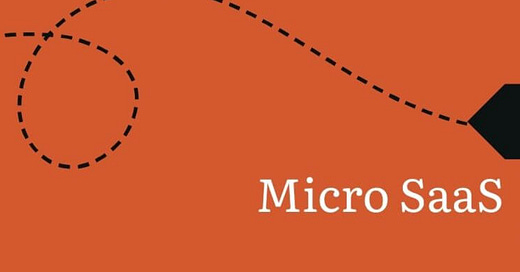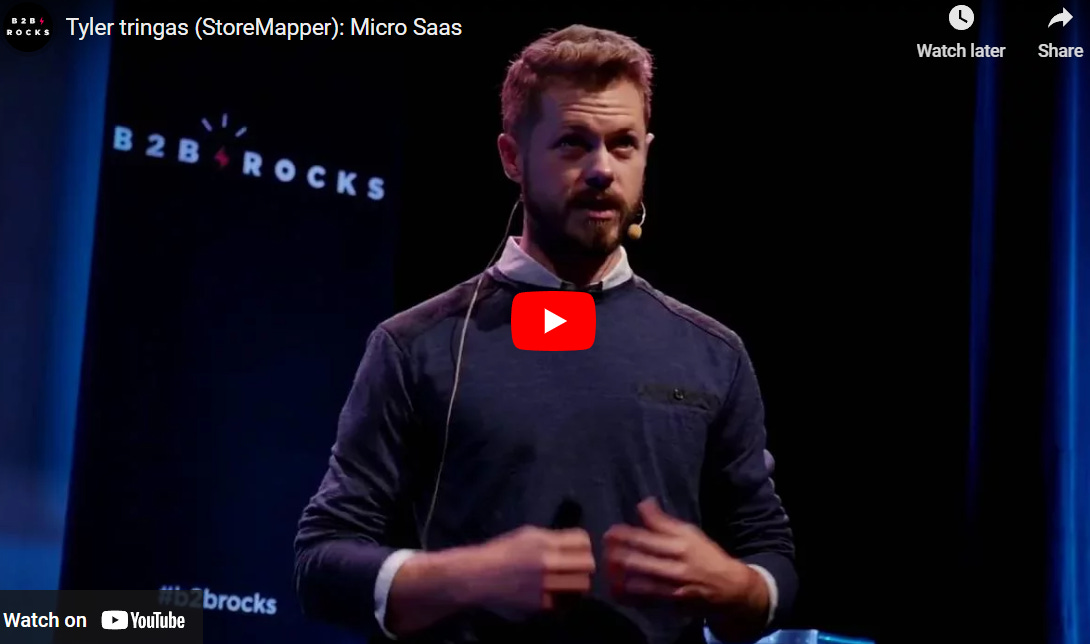Micro SaaS: Big Future for Small Solutions
Startups are getting smaller and focussed on niche problems. Are we heading to a future where every SaaS product becomes a Micro SaaS venture?
Four things you’ll get from TWIP today…
We believe there is a big future for small solutions. So we ponder whether every startup will be a Micro SaaS solution in the future.
Hear me speak at a panel discussion on the “SaaS-ification of Tamil Nadu”
Podcast: Building a $30k/month Micro SaaS in 14 Months.
News from this week that matters for product leaders.
🤖Micro SaaS: Big Future for Small Solutions
Software, once a physical commodity sold on tangible floppy/compact disks, moved to the intangible cloud services, ushering in the era of software as a service (SaaS). The SaaS industry today is set for another radical shift with the rapid rise of Micro SaaS.
For those unfamiliar with the Micro SaaS trend, Tyler Tringas an entrepreneur turned venture capitalist, coined the term in 2001 and popularized it online.
Tyler says, “In my mind, the micro in Micro-SaaS refers not to the size of the company or product, but to the scope of the problem being solved. I would usually define it as a product tackling a problem that could be truly solved with a solo founder or very small team.”
If you look closely, Micro SaaS is all around you.
The small productivity tools that streamline your workflow, the social media schedulers that save you hours, the calendar widgets you use, and the grammar checkers that polish your writing – most of them are Micro SaaS.
You can find them in your phone’s apps drawer or widgets, your software plugins, and browser extensions you use every day. According to a report by TrueList, Google Chrome has around 188,620 extensions. A sizeable number of them are Micro SaaS.
Currently, the average monthly income earned by Micro SaaS startups ranges anywhere between $100- $10,000. But we’ve also heard of founders like Amit Agarwal, a one-man team making $20m/year building niche Micro SaaS plugins!
The Future of Products: Micro, Faster, More Focused
🔍 If you build something for everyone, it works for no one.
You must’ve heard this oft-repeated quote within your product circles. Big SaaS companies solve lots of problems for lots of people. But, Micro SaaS solves a specific problem in a big way. That’s their strength.
The rise of Micro SaaS took two decades in the making after the term was coined by Tyler. But the trend of companies and products becoming ‘smaller’ has been predicted indirectly time and again, by Silicon Valley visionaries like Naval Ravikant.
In an old YouTube video that I revisited recently to derive insights for this article, Naval observes that the actual efficient size of a company is shrinking very rapidly.
Naval says, “The future will be, almost all startups of the world and most businesses will adopt the startup mentality in the sense that there will be small companies, loosely connected and coupled to each other almost through APIs or processes for their needs.”
We have already witnessed this transformation firsthand. The SaaS industry is slowly being populated by small and agile products with open API architectures, challenging the dominance of sprawling multi-product SaaS corporations like Salesforce and Hubspot in the US, or Freshdesk and Zoho in India.
In the next five years, we’ll see small replaced by micro.
Keeping that in mind, I predict that the sizes of organizations and products in the future will become even smaller until they turn “micro” - hyper-focused on solving critical needs of businesses or a cluster of users in a better way than currently solved by bigger startups which focus on a wider TAM (total addressable market size).
Naval’s observations in the same video also paint a brighter future for Micro SaaS startups turning into billion-dollar companies.
“I think the size of your average company is going to decrease. I think we're going to see more and more billion-dollar businesses built by four or five people and it'll stay at that.”
As Naval says in the video, these micro products can be connected through APIs and integrations into your workflows and to other products creating an eco-system of products working together, offering seamless ways to tackle your tasks and problems.
He also doesn’t think we’ll see many more companies like Facebook or Google with tens of thousands of employees
“I think any entrepreneur worth their salt could today build Facebook with a few hundred people… Facebook and Google are in the situation that large companies end up in where the founders know that 80% of the people are not really needed, they just don’t know which 80%.”
If Naval’s predictions were to turn true, as they often do, Micro SaaS or Medium SaaS businesses won’t necessarily need to be small companies in terms of revenue in the future. They can turn into internet behemoths.
Market Size: More Than Meets the Eye
If you are already thinking of jumping into the Micro SaaS bandwagon and searching for stats, pinpointing the exact market size for building micro subscription businesses is tricky (as I discovered during my research for this article).
It’s because most Micro SaaS players remain under the radar and not a lot of research has been done by analysts or big consulting firms on the Micro SaaS landscape.
However, certain estimates paint a promising picture:
Revenue in the bigger SaaS market is projected to reach US$339.10bn in 2024.
Unverified reports and anecdotes point out that 20% of all SaaS products today are Micro SaaS.
Micro SaaS startups may be small, but they solve big problems and they are on the rise.
My Trends and Predictions around the Micro SaaS Boom
No-code/Low-code Development: Platforms that enable building software with minimal coding are empowering entrepreneurs to create micro SaaS solutions without a hefty development budget.
Opportunity for Building Low Code Platforms: There is immense opportunity to build such low or no-code platforms that are intuitive to use for aspiring, non-tech, Micro SaaS founders.
AI-powered Micro-SaaS: Advancements in AI are leading to the creation of intelligent micro-SaaS solutions, like AI-powered content generators or data analysis tools. This injects powerful functionality into these compact offerings.
GenAI for Building Micro-SaaS: GenAI has already made it easy for anyone to design, build, and test applications without coding knowledge. More onus is now placed on user-focused product strategy, rather than coding, as users are valuing their product experience more.
Changing customer needs: Businesses are increasingly seeking specialized solutions that solve specific pain points, not bloated all-in-one packages.
Social media & community power: Building engaged communities around niche solutions is easier than ever, fostering organic growth.
Consolidation: As the market matures, larger players will acquire successful Micro SaaS companies as a part of their strategy to offer vertical product offerings.
It’s all about doing more with less
Today, you don't need much money to start something on your own. But you do need to start building at some point to gain leverage. By leveraging no-code tools, AI advancements, and community building, entrepreneurs can create impactful solutions for specific needs.
Ready to explore the world of Micro SaaS? Check out these resources to learn from successful founders and brainstorm your own niche idea:
Traveling, Learning to Code and Bootstrapping to $25k/mo - How did Tyler Tringas build and launch Storemapper in 36 hours?
FarMart - India's first micro-SaaS platform for food supply raises $10M
These Guys Built A Chrome Extension For Online Deals, Sold For Rs 28kCrore
If you are interested in Micro SaaS, let’s meet
I’m speaking about the “SaaS-ification of Tamil Nadu” - a Panel Discussion by YourStory
YourStory is organizing the Tamil Nadu Story 2024 - a full-day event on 19th July to empower the startups and homegrown brands of Tamil Nadu with valuable insights and resources as they take the next big leap towards scalable growth.
At the event, I’m speaking at a panel discussion on the “SaaS-ification of Tamil Nadu” along with Prabhu Ramachandran, Founder & CEO, Facilio Inc., Kuppulakshmi Krishnamoorthy, Global Head - Zoho for Startups, and Arunkumar Kumaresan, Regional Head - GCC region, Kovai.co.
Register and attend this event if you want to hear me speak and discuss my predictions on the rise of Micro SaaS products.
I found this podcast insightful
Podcast: Building a $30k/month Micro SaaS in 14 Months
In this podcast, Preetam Nath from SuperLemon (a Micro SaaS app for the Shopify store) shares how he scaled up a simple idea of a WhatsApp integration into the Shopify e-commerce store which generated $30,000 per month of recurring revenue in less than 14 months.
The SuperLemon team has just two people and they accomplished it without any external funding!
Also, read…
📰News from this week that matters for product leaders
GitLab explores sale: GitLab Inc., a US software developer backed by Google parent Alphabet Inc., is exploring a sale after attracting interest from potential bidders. The company builds tools that help companies manage their software development cycle. It has more than 30 million registered users.
Anthropic launches Android app for Claude: Amazon-backed Anthropic, the creator of ClaudeAI, has announced the launch of its Android app. It comes with the Claude 3.5 sonnet model and is a rival to ChatGPT. The app is currently offered free of cost.
Google ends Notes experiment: Google Search Labs ended the Notes experiment it introduced in Search in November last year. The idea was to create a personalized search feature for user-generated insights and encourage discussions. According to 9to5Google, the feature is now coming to an end without launching.
MeitY to train 10,000 Indian startups in AI: Google is working with the Ministry of Electronics and IT's (MeitY's) Startup Hub to train and support 10,000 Indian startups in AI. Google is providing startups with AI-first programming and curriculum through its programs such as Appscale Academy and Startup School, helping them with skills, knowledge, and mentorship.
IIT-Madras to Allot Rs 5 Crores For Sports-Tech Startups: IIT-Madras is planning to provide up to Rs 5 crore in funding to support sports-tech startups in India. The investment support for each startup can range from Rs 10 lakh to Rs 50 lakh, based on business potential and equity stake by IITM Pravartak Technologies Foundation. Even startups at an initial stage can be considered for funding if they have incorporated their company and intellectual property rights.
I hope you enjoyed this week's curated stories and resources. Check your inbox again next week, or read previous editions of this newsletter for more insights. To get instant updates, connect with me on LinkedIn.
Cheers!
Khuze Siam
Founder: Siam Computing & ProdWrks









